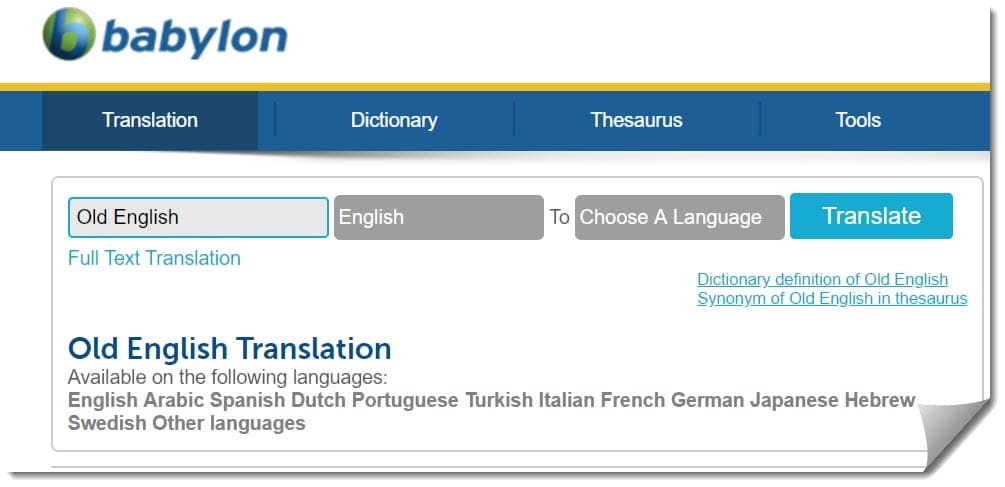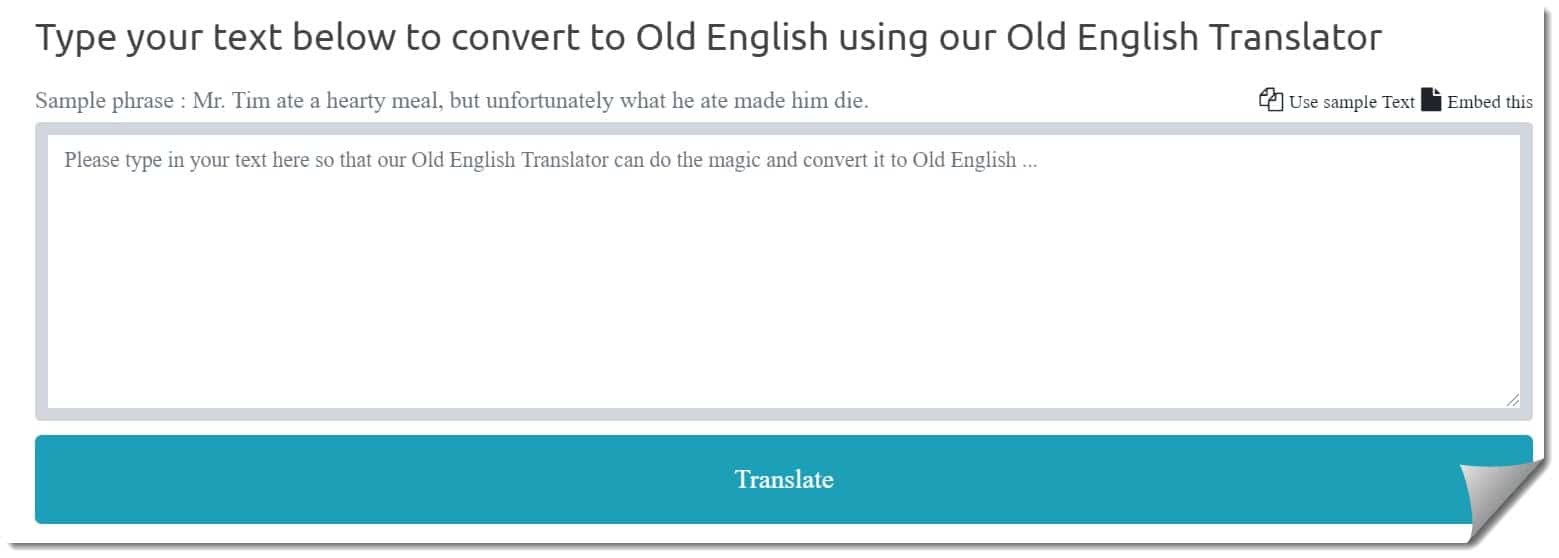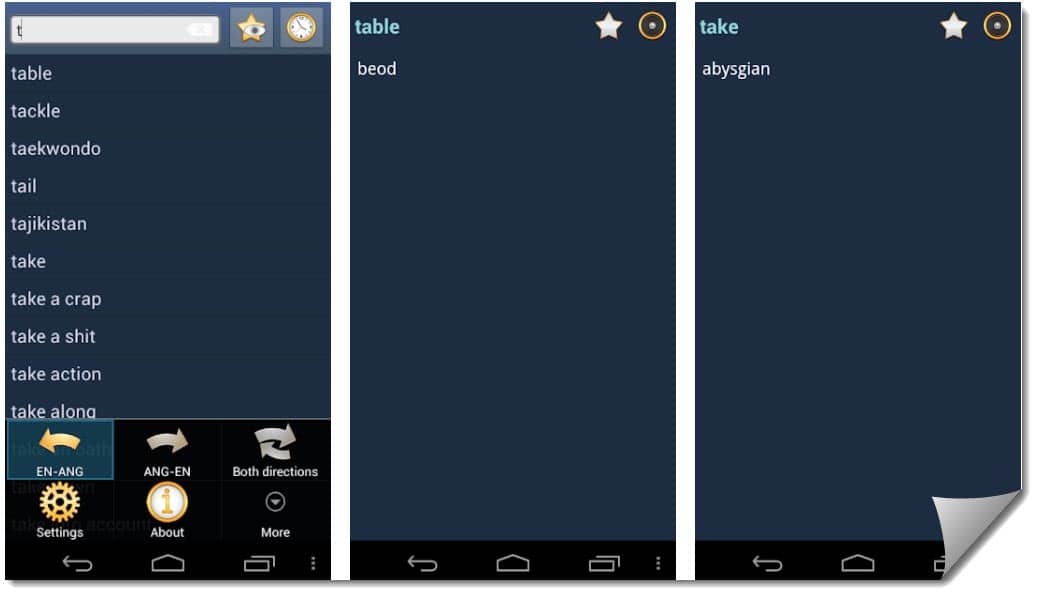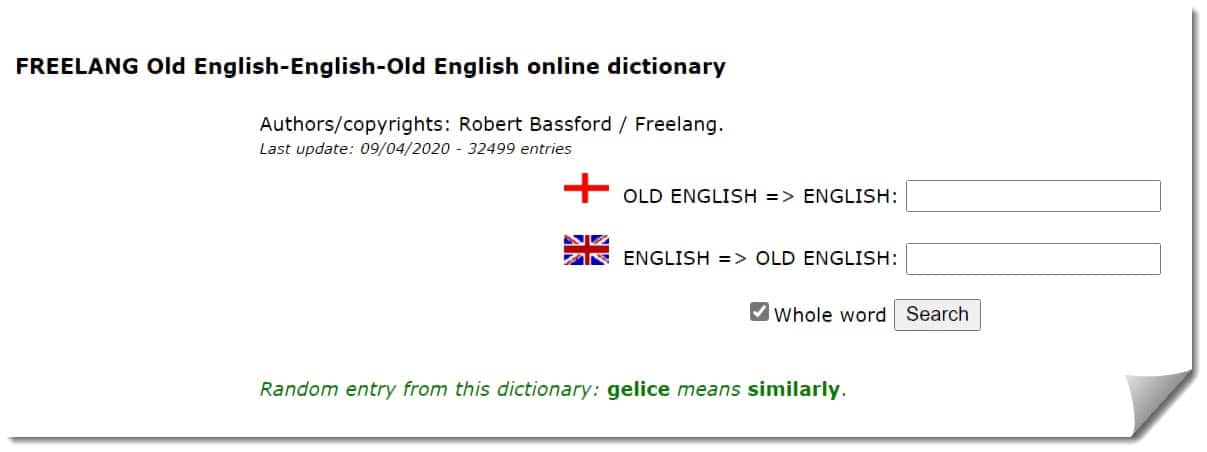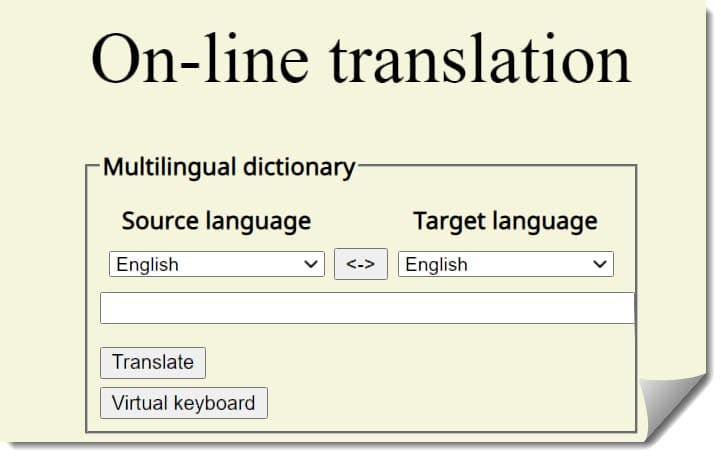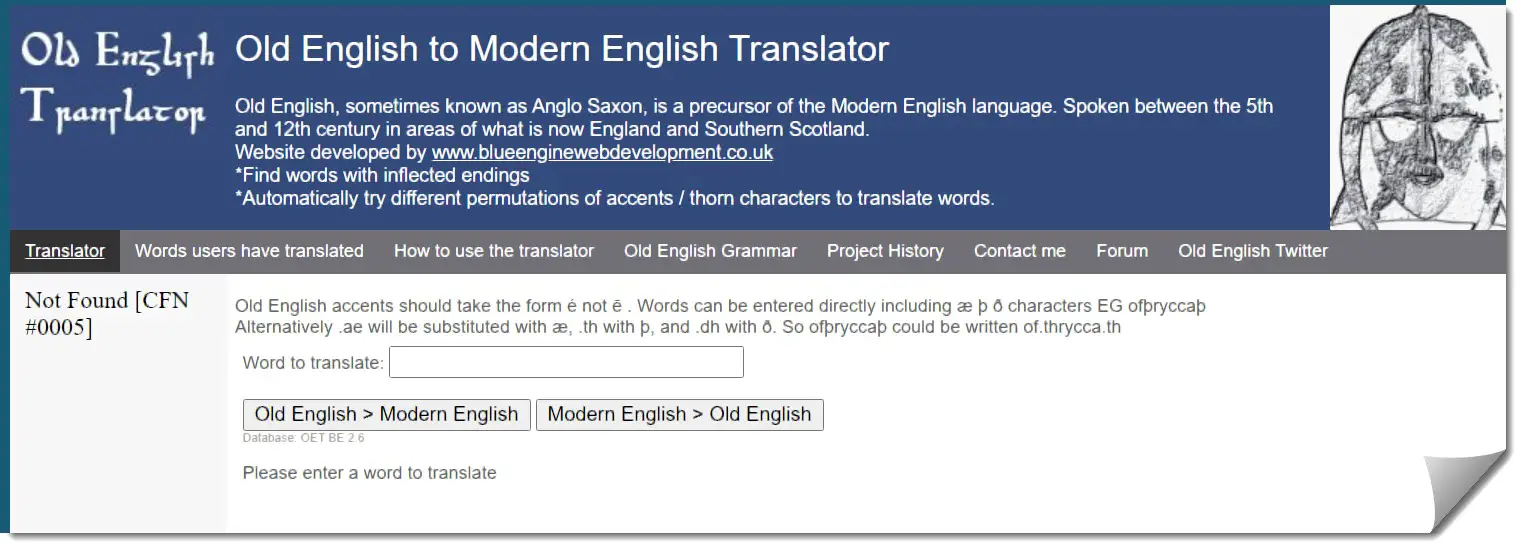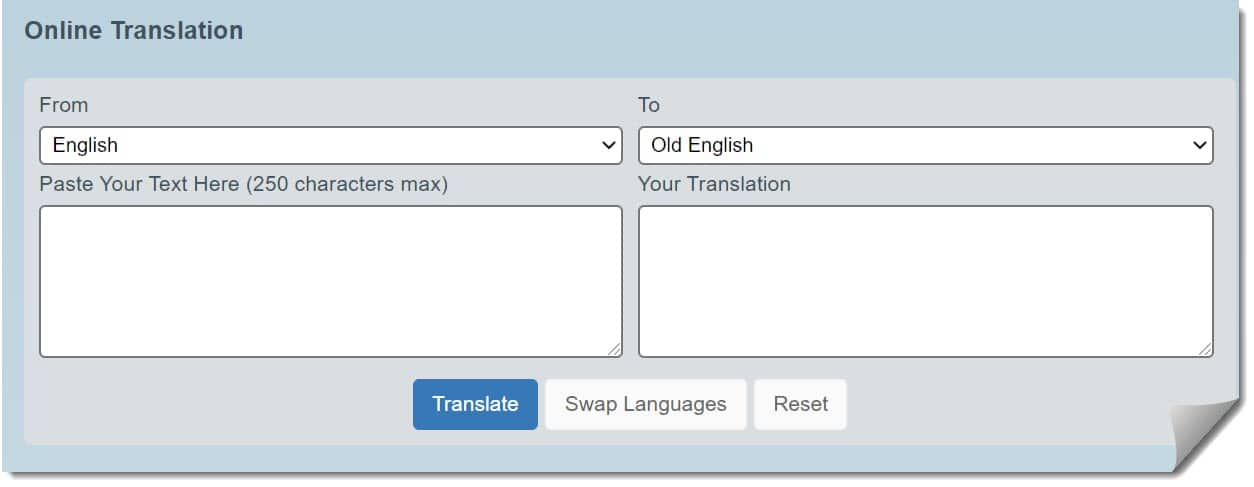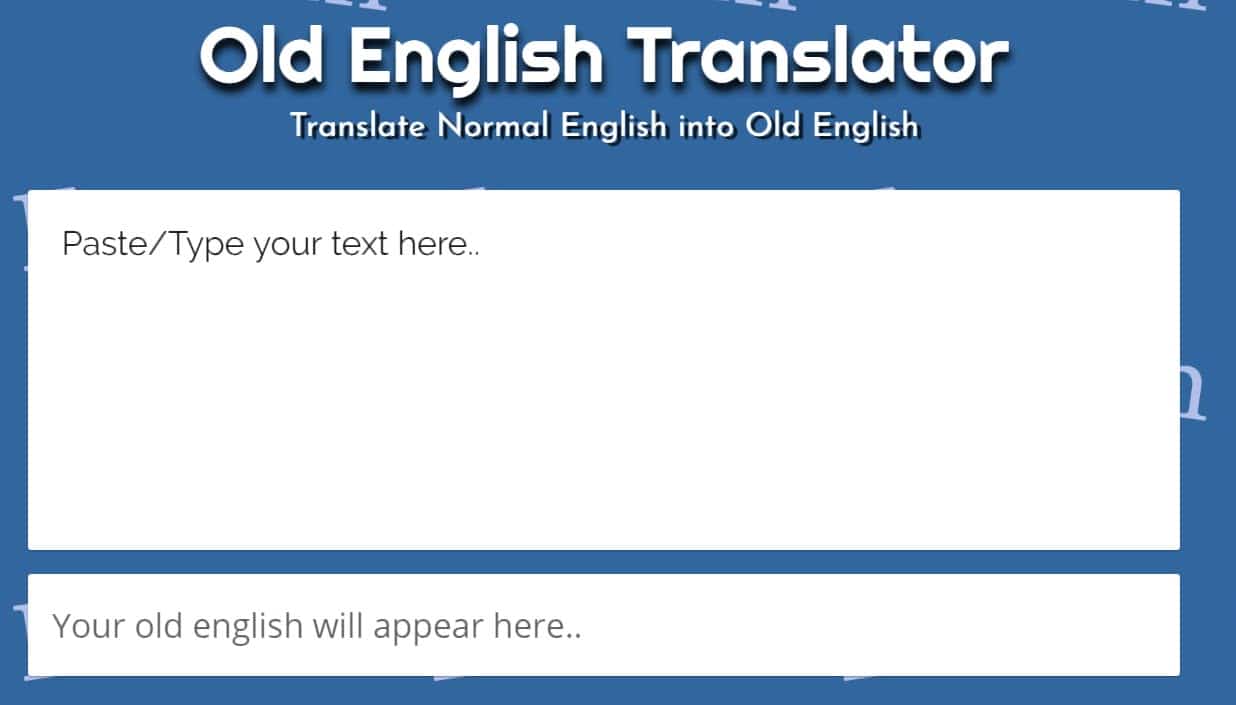Are you struggling to understand Old English texts or need to translate them for research or personal reasons? Trying to decipher archaic language without the necessary skills and knowledge can be frustrating.
This is especially true if you are interested in Old English literature, history, or genealogy. You might miss out on important details or misunderstand the text entirely.
But don’t worry; there’s a solution: an Old English translator. With the help of an Old English translator, you can easily translate Old English texts and better understand the language and culture of the past.
In this article, we’ll explore the benefits of using an Old English translator and how it can help you unlock the mysteries of the past.
So, let’s dive in!
Best Free Old English Translator Websites 👌
1. Old English Translator
This is a robust and versatile application (Visit Here). It allows you to multitask efficiently.
To interpret an Old English word into Modern English, the most straightforward technique is to type (or duplicate/glue) the name on the one side of “Word to decipher” and click/press the ‘To Modern English’ button, and the outcomes at that point will be shown.
Early English is an arched language, with each word having various structures for multiple cases. Assuming you saw the name ‘ofþryccaþ’ in a book and needed to decipher it.
If you’ve looked at a word guide that only included root terms, you wouldn’t have learned that the phrase ‘porayrycca’ isn’t the root word.
This is where this excellent translator, with its extensive libraries, makes your job easier.
The Old English Interpreter has several case closures to calculate the definition in its files. The other issue frequently experienced is that the characters regularly have various structures. Often these systems represent something else, and sometimes they don’t.
For example, if you search for ‘poirrycca-pop’ and the word reference has the word ‘poirrycca-pop’ or ‘ōf-poirryccā-pop’ (note the distinctive character positions), and an essential match is played, the name will not be found.
2. Lingojam Old English Translator
Lingojam translator came out with this fantastic component of changing over advanced English content into early English.
The app (Visit Here) is incredibly professional because it only takes responsibility for the decryption of the material or scripts.
Some could be familiar with the web, but individuals who do not know the internet can easily handle the extensive features.
The UI is not complicated; even a layperson can use that with no prior training or knowledge.
Visit the site and begin editing as possible in the left area. Also, the result will be seen next to it in the event. Use the repeat glue technique to use the created material.
3. Babylon NG
This versatile tool (Visit here) will allow you to translate Old English Words into multiple languages, including Arabic, French, Italian, German, Hebrew, Japanese, and more.
The extensive customization opportunities make it one of the most distinguished software available today.
There are two sections on the website, one for entering the Old English Words, followed by the output section in which the words will be translated into the preferred language.
4. Fun Translations
Fun Translations is a multilingual interpreter. It also carries out the responsibility of an efficient and durable early English interpreter.
The webpage offers other apparatus choices and highlights, which you can access for free.
Once you enter the site, look down a smidgen and discover a book box passage. Begin composing there as much as reasonably expected, and click on the “Interpret” button after you’re done.
There is no window for displaying the output. When you request for Translation, it processes your request and then shows the output in a yellow color text area. You can analyze the text from there and move it anywhere you want.
You also get extra features; primarily, you can write on Twitter, and secondly, it allows you to make your clothes with the text you have.
If you are a regular user and do this task of translating modern English to old English, then you can also avail of the API file of the translator on your device. In that instance, you might have to pay an amount to gain access to their premium features.
At the time of our research on old english to modern english translator, we found a video about “A Cool Grammar Test That 95% of People Fail,” which is worth watching.
5. Old English Dictionary
The software allows you to access extensive libraries created to ease the translation process. The large-scale productivity features add to its versatility.
The Old English term search on this blog includes a lot of Old English terminology. Decipher the old English words using the Anglo-Saxon word connection. You can access this Android-oriented platform for low prices from the Play Store.
After you are over with the accessing and foundation process, open the application and select “EN-ANG.” It will help you decipher the front-line English term into early English.
On the other hand, it can decipher early English terms to introduce present-day English words. For that, you need to pick “AN-EN” and, shortly afterward, start filtering for words in old English.
The tremendously beneficial part of this application is that you don’t need to turn on your gadget’s Internet affiliation. It works independently.
Along these lines, you can get a voice accomplice if you are perplexed about the best way to communicate any word. You can use it to interpret it effectively.
6. Freelang
Freelang isn’t just any online free early English interpreter device. This is because it proficiently does the fabulous task of an interpreter.
It has added customization features and remote accessibility from your PC or Android device.
This is why this product is recommended for the list of early English interpreters. You can get to both the first English-to-present-day English just as current English-to-early English word conversion in the application.
You can download the application for your gadgets (either Windows PC or Android) and investigate new words from the word reference.
Furthermore, the organization furnishes you with a free online interpreter, which you can access to improve productivity.
In this manner, if you are short on space on your PC and want a unique, portable solution, you can always choose to utilize your mobile device.
7. Old English Vocabulary
This website (Visit Here) does a fabulous job listing some of the most critical and essential Old English words and their translations.
It can help a lot of people trying to write articles. The list displays some 475 Old English words that may be considered crucial literary vocabulary.
A large consortium of very popular words in Old English literature is displayed here. The other set of concepts presented is important regarding their grammatical or language use. Cognates in a variety of different styles are built to allow the memorization of names simpler.
The Old English list is meant as a blueprint for teachers. The hope is that students will make good use of this software. The software can be used by students pursuing degrees in colleges and universities and those in school.
8. EOW: Onstigende Wordbōc English
EOW is an online Old English interpreter aiming to decipher single words from New English to English dating back to the 1st century BC and vice versa.
It holds 5000 Old English words and 5500 Modern English words. EOW may be used to avail of either Anglo-Saxon or current English words.
Many Anglo-Saxon words are usually composed of macrons to show the length of the vowel. EOW can also display morphological data ( e.g., action word intonations) for a set number of Anglo-Saxon names.
9. Majstro – old English translator online
Majstro is a web-based English Translator where you need to insert the expression you need to translate, and it switches from early English to current English.
Its guide often includes several specific highlights, such as Hangman, Multilingual Translating Word Comparison, English-German Word Comparison, Translation of Sentences, etc.
It gives you the option of an easy-to-use keyboard that can be used to write in various foreign languages.
10. Early English Translator
Early English Translator (Visit Here) is a great online interpreter. This interprets Ancient English to New English and the opposite way around it.
To use the translator, press the ‘Interpreter’ button on the left and type (or duplicate/glue) a phrase in the area on one side of the ‘Decryption Key’ button.
Press the ‘Early English > Modern English’ button at that point, and the results should be shown at that juncture.
11. Old English Translation Services
Interpretation Services USA (Visit Here) offers proficient interpretation options for English to Old English and Old English to English language sets.
The software can likewise interpret Old English to and from many other world languages. This software can convert into more than 100 distinct dialects.
For web journals and small, individual locales, they offer basic, free site interpreter devices and WordPress modules. You can self-introduce them on your page for quick, simple interpretation into many significant dialects.
12. Glosbe Old English Translations
The Glosbe Dictionaries are advanced. Not only can translations into English or Old English be checked at Glosbe, but they also provide examples of usage by providing hundreds of examples of translated words.
It is based on the “memory translation” principle and delivers supreme performance. You can see the pronunciation of the word and the way it acts in the sentence. Translation Memory comes primarily from parallel human-created companies.
In addition to dictionaries, these translated phrases are useful. One revolutionary aspect of Glosbe is that you can even contribute to the world of Old English translations by entering translations for words you may know. This is going to support people.
To conclude, there is A Great Alternative Option that allows you to Customize Text Too!
13. Font Villa
Fontvilla is a website with a broad range of online resources and converters used to improve the look of your text.
It consists of resources ranging from basic text editors to font updates. It can change font type and letter height, render text italic, bold, and spaces, and translate it into runic, braille, and the list goes on and on.
A brand new translator is one of the most technologically sophisticated devices. It does work both ways when reading and turns English into early English. It also modifies the text font while changing the paragraph’s syntax.
And if you’ve ever felt like returning to the past or acting like an old Englishman, feel free to use this device to your taste.
It will undoubtedly help you customize and enhance your profile page look and feel, increasing your number of followers and your user interaction with your posts.
The method eradicates the lengthy, time-consuming process of identifying the correct words and then structuring them to form a complete sentence.
Everything you need to remember is how to copy and paste, which can even be skipped.
Here are the instructions on translating text from modern to old English using the converter method.
First, you must grab and paste the text in the dialogue box above. You can also write the document directly to the window. Then, what you need to do is use the convert button. Now grab the converted text and paste it anywhere you want to.
The text you have translated should be in Unicode. This implies that you’ve got a chance to paste it wherever you want. However, slight compatibility problems can occur mainly because few browsers support Unicode.
The problem can be quickly solved by changing your browser to one that supports all Unicode characters. Mozilla Firefox is a perfect browser for this reason.
Pros of Old English to New English machine interpretation
First of all, it is amazingly cheap. Several free applications are accessible to decipher content, pictures, composed, and spoken words by merely clicking a catch.
The machine interpreters are extremely easy to use, with applications permitting words and expressions to be written, spoken, captured, or composed on screen.
Machine interpretation is quick; immense content measures can be deciphered in a couple of moments or seconds. However, human interpreters take extended periods to read such rules of content.
Machine Translation is pure to use; anybody can download interpretation applications or access a site.
Old English interpreters imply that one program can decipher several distinct dialects and an enormous measure of interpretation, which one human interpreter can never accomplish.
In this way, machine interpretation is precious for individuals with colossal means of content to be deciphered in exceptionally exacting time.
Cons of Old English to New English machine interpretation:-
Quality is the most significant hindrance to machine interpretation, as the applications produce incorrect descriptions.
Machine interpreters can’t get writings or the intricacy of the language utilized, for example, similitudes and mottos, which prompts imprecise translations.
A human interpreter perceives where exacting analysis is beyond the realm of imagination and finds the conceivable option dependent on his comprehension of the content.
Old English machine interpreters cannot care for uncertainty or phonetic issues, while human interpreters can be proficient.
For instance, any legitimate interpreter worldwide would see and adjust a missed or wrong word in a unique record. Yet, the PC would decipher the off-base word without comprehension or thinking.
Machine interpreters consistently default to the least complex conceivable word decision and sentence structure, prompting the loss of the genuine significance of the content.
Machine interpretation isn’t socially delicate as machines can not encounter societies, so the presentations delivered may not be suitably touchy to specific qualities and standards of a culture.
Is there an app to Translate Old English?
Some of the best options are Old English Translator, Early English Translator, Lingojam Old English Translator, Freelang, Majstro, and Babylon NG.
Here’s a table of apps that can help you translate Old English:-
| App Name | Description | Platform | Cost |
|---|---|---|---|
| Beowulf | A free app that includes the full text of the famous Old English epic poem “Beowulf,” with an option to view a modern English translation alongside the original text. | iOS, Android | Free |
| Anglo-Saxon Reader | An app that includes a collection of Old English texts with translations, glossaries, and grammar notes to help learners understand the language. | iOS | $4.99 |
| Old English Translator | An app that allows users to input words or phrases in modern English and receive a translation into Old English. The translations are generated using an algorithm, so they may not be 100% accurate. | iOS, Android | Free |
| King Alfred’s Grammar | An app that teaches the grammar of Old English using King Alfred’s own writings as examples. Includes exercises and quizzes to help learners practice. | iOS | $2.99 |
| Old English Dictionary | An app that provides a searchable database of Old English words with definitions and examples of usage. | iOS, Android | Free |
| Old English Translator & Dictionary | An app that offers both a translation service and a dictionary for Old English. Users can input words or phrases in modern English and receive a translation, or search for Old English words and find definitions and examples of usage. | iOS | Free |
Translate to Old English with Ease: Old English Translator Tool
Some of the best Old English translator tools available online include Bosworth-Toller Anglo-Saxon Dictionary,Old English Translator ,Beowulf Glossary, Michigan Corpus of Old English and Clark Hall Old English Dictionary
Here’s a table summarizing some of the best Old English translator tools available online:-
| Tool Name | URL |
|---|---|
| Bosworth-Toller Anglo-Saxon Dictionary | https://bosworthtoller.com/ |
| Old English Translator | https://www.oldenglishtranslator.co.uk/ |
| Beowulf Glossary | http://www.heorot.dk/beowulf-rede-notes.html |
| Michigan Corpus of Old English | http://quod.lib.umich.edu/m/middle-english-dictionary/dictionary |
| Clark Hall Old English Dictionary | http://bosworth.ff.cuni.cz/027378 |
📗FAQ’s
Does Google Translate have Old English?
No. Since a significant compilation of Old English literature does not exist on Google Translate, its engine can’t translate text written in Old English.
Is it thou or thy?
Thou and thy are famous forms of the term ‘you.’ The nominative form is thou, while thy is the possessive form (that is an adjective).
When did Old English end?
Spoken and written in Anglo-Saxon Britain, Old English is the earliest form of British English literature used for several decades. However, the Old English language was discontinued in the year 1150.
Does thine mean my?
No. Thine is a pronoun used for an individual that means ‘yours’ in Modern English.
Which accent is closest to Old English?
The dialect of the residents from the West Country counties is the closest to the Old English language.
These regions are Somerset, Dorset, Gloucestershire, Cornwall, and Devon. For instance, people here will say, “I be,” but not I am.
How do you say you in Old English?
The word for “you” in Old English is determined by the grammatical person and number of the subject. These are the several ways in Old English to say “you”:
The pronoun “you” is appropriate when speaking to a single person in the second person singular (thou).
In the second person plural, you can use the pronoun “ge” if speaking to more than one person (ye).
The pronoun “e” can be used when speaking to someone in the second person formal (i.e., as a sign of respect or politeness) (thee).
Here are some examples of how to use these pronouns in Old English:
“Þú eart se goda mann” (Thou art the good man)
“Ge eart swiþe god” (Ye are very good)
“Þe eart se leofa mann” (Thee art the dear man)
How do you say I love you in Old English?
The phrase “Ic é lufie” can be used to express “I love you” in Old English (pronounced “ik thay loo-vee-ay”).
The literal translation of this phrase is “I thee love,” where “ic” stands for “I,” “é” for “thee” (a variant of “you” used to address one another in the second person formal), and “lufie” for “love.”
The phrase in context is given below:
“Ic þé lufie swiþe” (I thee love very much)
What is the old English language?
West Germanic language Old English, commonly known as Anglo-Saxon, was spoken in England from the fifth to the eleventh centuries.
It served as the basis for Middle and Modern English, and many of the major works of English literature, like Beowulf and The Canterbury Tales, were written in it.
One of its distinctive characteristics is the highly inflected grammar of Old English, which allows word ends with varying depending on their grammatical function in a sentence.
With many terms and expressions that are no longer used in contemporary English, Old English also had a large and varied vocabulary.
For anyone interested in the evolution of the English language and its history, learning Old English may be a gratifying and fascinating experience. Additionally, it might help one comprehend and appreciate the literature and culture of the Anglo-Saxon era more deeply.
Old English is an important resource for linguists and scholars interested in language evolution, the connections between various languages and language families, and its historical and cultural relevance.
For those interested in the development of the English language and its history, Old English is a rich and intriguing language that is well worth learning.
What is hello in Old English?
The Old English word for “hello,” “lae,” is derived from the greeting “ls hl” and is pronounced “ayl-way” (pronounced “ayl-wayz hail”). Like the current English greeting “hello,” this greeting is meant to wish someone health and well-being.
Here is the phrase “ǽlƿæs hāl” in context:
“ǽlƿæs hāl, hƿæt mǽg ic gōdne geþōht habban be þé?” (Hello, how may I have good thoughts about thee?)
What language is the closest to Old English?
They all belong to the same language family and have numerous similarities in terms of syntax, vocabulary, and pronunciation, including Old English, Old High German, and Old Frisian.
They are all extremely inflected languages with intricate grammars, and they share many cognates (words connected by a common ancestor) with one other and contemporary English, German, and Frisian.
Overall, the West Germanic language family’s closest living cousins are Old English, Old High German, and Old Frisian.
Conclusion
After analyzing the benefits of using an Old English Translator, it’s evident that this tool is essential for anyone looking to explore the rich history of the English language.
Whether you’re a literature enthusiast, a historian, or simply curious about the evolution of language, an Old English Translator can provide a wealth of knowledge and entertainment.
With its user-friendly interface and accurate translations, you can be sure you’re getting the most out of your Old English Translator.
By using this tool, you can gain a deeper understanding of the cultural and linguistic roots of the English language.
So, why not give it a try? Whether you’re looking to read classic texts in their original form or want to impress your friends with your newfound knowledge of Old English, an Old English Translator is the perfect tool for the job.
Start exploring today, and discover the fascinating world of Old English for yourself!



























